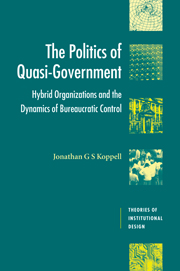Book contents
- Frontmatter
- Contents
- List of figures
- List of tables
- Acknowledgments
- List of acronyms
- 1 Introduction
- 2 Building a better model of bureaucratic control
- 3 Administration by regulation
- 4 Principal's preference, organizational structure and the likelihood of control
- 5 Hybrid organizations and the alignment of interests
- 6 The limits of congressional control: agent structure as constraint
- 7 Regulating hybrids: structure and control
- 8 Conclusion
- Appendix: background of organizations studied
- Interview subjects
- References
- Index
6 - The limits of congressional control: agent structure as constraint
Published online by Cambridge University Press: 22 September 2009
- Frontmatter
- Contents
- List of figures
- List of tables
- Acknowledgments
- List of acronyms
- 1 Introduction
- 2 Building a better model of bureaucratic control
- 3 Administration by regulation
- 4 Principal's preference, organizational structure and the likelihood of control
- 5 Hybrid organizations and the alignment of interests
- 6 The limits of congressional control: agent structure as constraint
- 7 Regulating hybrids: structure and control
- 8 Conclusion
- Appendix: background of organizations studied
- Interview subjects
- References
- Index
Summary
Successful congressional control is more elusive with respect to hybrid organizations than to traditional government agencies. The difference is a function of the interaction between the prerequisites of effective oversight and the organizational structure of hybrids. There is no indication that this outcome was intended; nor does it appear to satisfy the preferences of any enacting coalition. It is, it seems, an unforeseen consequence of the turn to quasi-government.
Whether one envisages Congress in a purely altruistic fashion, with Members seeking only the greatest public good for the nation as a whole, or as a collection of individuals with an overriding self-interest in re-election, the ability to compel bureaucratic agents to satisfy preferences is critical. Without effective oversight, the capacity of Congress to govern is reduced.
For any Congress the prerequisites of control are the same. Congress requires the timely acquisition of data regarding performance, regular opportunities for review, unlimited access to information and the power to shape and reshape the legislation governing the budget, priorities and operations of the overseen entity. This chapter explains why key features of hybrid organizations blunt the tools utilized by Congress to satisfy these requirements.
Tools of congressional control
Congress has multiple tools available to control its bureaucratic agents. Of course, it has the power to rewrite law thus altering the structure of agents as well as the procedural requirements with which they must comply and the substantive ends they are charged with achieving. Congress also carries out regular oversight of its agents.
- Type
- Chapter
- Information
- The Politics of Quasi-GovernmentHybrid Organizations and the Dynamics of Bureaucratic Control, pp. 122 - 141Publisher: Cambridge University PressPrint publication year: 2003



